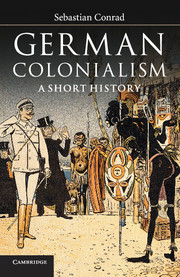Book contents
- Frontmatter
- Contents
- Illustrations
- Maps
- Acknowledgements
- Chapter 1 Introduction
- Chapter 2 Colonialism before the colonial empire
- Chapter 3 Pressure groups, motivations, attitudes
- Chapter 4 The German colonial empire
- Chapter 5 The colonial state
- Chapter 6 Economy and work
- Chapter 7 Colonial society
- Chapter 8 Knowledge and colonialism
- Chapter 9 The colonial metropole
- Chapter 10 Colonialism in Europe
- Chapter 11 German colonialism and its global contexts
- Chapter 12 Memory
- Chapter 13 Selected readings
- Index
- References
Chapter 9 - The colonial metropole
Published online by Cambridge University Press: 05 June 2014
- Frontmatter
- Contents
- Illustrations
- Maps
- Acknowledgements
- Chapter 1 Introduction
- Chapter 2 Colonialism before the colonial empire
- Chapter 3 Pressure groups, motivations, attitudes
- Chapter 4 The German colonial empire
- Chapter 5 The colonial state
- Chapter 6 Economy and work
- Chapter 7 Colonial society
- Chapter 8 Knowledge and colonialism
- Chapter 9 The colonial metropole
- Chapter 10 Colonialism in Europe
- Chapter 11 German colonialism and its global contexts
- Chapter 12 Memory
- Chapter 13 Selected readings
- Index
- References
Summary
One of the most innovative ideas to come out of the field of post-colonial studies and more recent studies on empire has been the suggestion that the histories of the colonizers and the colonized should be examined within one coherent analytic field. For a long time, historiography was dominated by a perspective that interpreted colonial contacts in terms of influence and diffusion. In this view, European expansion led to irreversible changes in indigenous societies, changes that could be interpreted as being either positive (cultural mission and modernization) or negative (oppression and exploitation). Thus Europe, it was believed, had radically changed the world without itself being greatly affected by those changes. This one-sided view has recently been replaced by a perspective that no longer views European history and colonial history as separate entities, but accepts that the numerous links and processes of exchange that existed between them were constitutive for both.
This approach has brought interesting results for British history in particular; it has revealed the extent to which colonial links shaped the dynamics of British society and economy, everyday life in the metropole, and British nationalism. Such a change in perspective can also be useful for understanding German society. Because the German colonial empire lasted for a much shorter period, it is not surprising that the effects are less obvious, can be found primarily in the areas of representation and popular culture, and were themselves shorter-lived. Yet here, too, we can identify cases of ‘double inscription’, as Stuart Hall has termed the complex interactions between metropole and colony. Wilhelmine Germany, in diverse and not always obvious ways, was shaped and influenced by the effects of the colonial encounter.
- Type
- Chapter
- Information
- German ColonialismA Short History, pp. 136 - 152Publisher: Cambridge University PressPrint publication year: 2011



